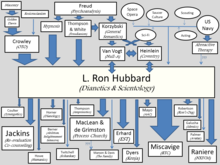Advanced Ability Center
| Formation | 1983 |
|---|---|
| Headquarters | United States |

The Advanced Ability Center was a breakaway organization from the Church of Scientology established by former Scientologist David Mayo after he left the Church in February 1983, a time when most of Scientology's upper and middle management was removed following the formation of the Religious Technology Center (RTC) and RTC head David Miscavige's restructuring of the church.[1] David Mayo had been Hubbard's own auditor.[1] The Advanced Ability Center later became the Theta International movement[2] and was also known as the Church of the New Civilization.[3]
Mayo taught material from the upper part of The Bridge of the Scientology organization in the Advanced Ability Center.[4]: 97 A division of the Advanced Ability Center was closed down again in 1984 under pressure from the main organization.[1] According to Perspectives on the New Age edited by James R. Lewis and J. Gordon Melton and published in 1992, the Advanced Ability Center formed in Milan was in competition with the Scientology organization in Italy.[5]
David Mayo
[edit]Mayo joined Scientology in 1957 as a staff member, and joined the Sea Org in 1968. He trained with L. Ron Hubbard up to the level of Class XII auditor and worked with Hubbard on the OT levels 5 to 7.[6]: 36-7 Mayo had been L. Ron Hubbard's auditor and rose to the position of Senior Case Supervisor International in the Church of Scientology. He was ousted during David Miscavige's struggle for power, declared suppressive and sentenced to the "running program" (physical punishment) in 1982. Mayo escaped and founded the Advanced Ability Center.[7]: 99–101 [6]: 36-7 Religious Technology Center sued Mayo in Los Angeles federal court claiming intellectual property infringement, filed a RICO suit, and started an extensive harassment campaign against him and AAC. Mayo countersued, and RTC was sanctioned millions of dollars.[7]: 124–5 [8]: 157–8 In 1985, Scientology successfully enjoined Mayo from selling Scientology services and AAC was bankrupted and closed by 1986.[8]: 158
See also
[edit]References
[edit]- ^ a b c Nordhausen, Frank; von Billerbeck, Liane (2008), Scientology. Wie der Sektenkonzern die Welt erobern will (in German), Berlin: Ch. Links Verlag, pp. 278, 288, 302, ISBN 978-3-86153-470-9
- ^ Abgrall, Jean-Marie (1999). Soul Snatchers: The Mechanics of Cults. Algora Publishing. p. 294. ISBN 978-1-892941-04-6.
- ^ Richardson, James T. (1988). Money and Power in the New Religions. E. Mellen Press. p. 81. ISBN 978-0-88946-852-8.
- ^ Lamont, Stewart (1986). Religion Inc. : The Church of Scientology. Harrap. ISBN 0245543341. OL 2080316M.
- ^ Lewis, James R.; J. Gordon Melton (1992). Perspectives on the New Age. State University of New York Press. p. 277. ISBN 978-0-7914-1213-8.
- ^ a b Atack, Jon (1990). A Piece of Blue Sky: Scientology, Dianetics and L. Ron Hubbard Exposed. Lyle Stuart Books. ISBN 081840499X. OL 9429654M.
- ^ a b Rinder, Mike (2022). A Billion Years: My Escape From a Life in the Highest Ranks of Scientology. Simon & Schuster. ISBN 9781982185763.
- ^ a b Reitman, Janet (2011). Inside Scientology: The Story of America's Most Secretive Religion. Houghton Mifflin Harcourt. ISBN 9780618883028. OL 24881847M.
